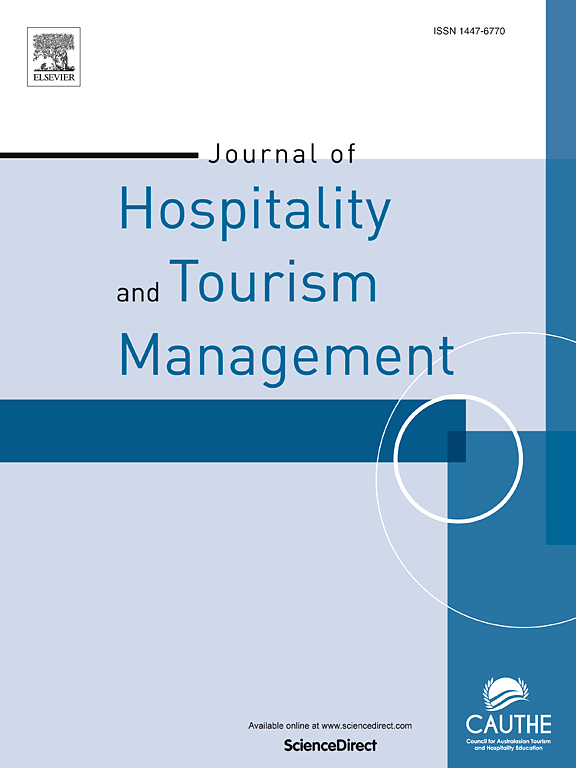Does information overload attract or Repel self-driving tourists?
IF 7.8
1区 管理学
Q1 HOSPITALITY, LEISURE, SPORT & TOURISM
引用次数: 0
Abstract
In the digital age, tourists face an increasing amount of travel-related information, leading to more severe information overload, particularly evident in self-driving tour decision-making. However, current research often overlooks the impact mechanisms of this overload on individual psychological states and travel behaviors, especially in emerging tourism markets. This study aims to explore the impact mechanism and boundary conditions of information overload on the travel intentions of potential self-driving tourists. Based on the Stimulus-Organism-Response (SOR) theoretical framework, a moderated chain mediation model is constructed to deeply analyze the mediating roles of organism factors such as perceived risk, attitudes, and destination image, as well as the moderating effect of self-driving tour knowledge. The study used convenience sampling to collect data through an online survey from 728 potential tourists interested in visiting Shangri-La, China. The collected data were analyzed using structural equation modeling (SEM) and the bootstrap method to test the theoretical model. The results indicate that information overload significantly positively affects perceived risk and negatively impacts destination image, while its effect on attitudes is not significant. Meanwhile, the study finds that although information overload does not have a significant direct impact on travel intentions, it can indirectly influence tourists' travel intentions through the mediating effects of perceived risk and destination image, as well as the chain mediation effect. The results also validate the chain mediation effects of perceived risk and attitude between information overload and travel intentions. Additionally, the study reveals that extensive self-driving tourism knowledge can weaken the positive impact of information overload on perceived risk and reduce its negative impact on destination image, thereby enhancing potential tourists' travel intentions. Finally, the study uncovers the heterogeneous effects of socio-demographic characteristics, such as gender, age, income, and geographical location, on self-driving tourism behavioral decision-making. This study provides new insights into the self-driving tourism decision-making process and offers practical guidance for online tourism service providers and destination management organizations in optimizing information presentation, reducing perceived risks in self-driving tourism, and enhancing destination attractiveness.
信息超载是吸引还是排斥自驾游游客?
在数字时代,游客面临的旅游相关信息越来越多,导致信息过载更加严重,这在自驾游决策中表现得尤为明显。然而,目前的研究往往忽视了这种超载对个体心理状态和旅游行为的影响机制,特别是在新兴旅游市场。本研究旨在探讨信息超载对潜在自驾游游客旅游意愿的影响机制和边界条件。基于刺激-生物-反应(SOR)理论框架,构建了一个有调节链的中介模型,深入分析了感知风险、态度、目的地形象等生物因子的中介作用,以及自驾游知识的调节作用。该研究采用方便抽样的方式,通过对728名有兴趣访问中国香格里拉的潜在游客进行在线调查,收集数据。利用结构方程模型(SEM)和自举法对收集到的数据进行分析,对理论模型进行检验。结果表明,信息超载对感知风险有显著正向影响,对目的地形象有显著负向影响,而对态度的影响不显著。同时,研究发现,信息超载虽然对旅游意愿没有显著的直接影响,但可以通过感知风险和目的地形象的中介效应以及连锁中介效应间接影响游客的旅游意愿。结果还验证了感知风险和态度在信息超载与旅游意愿之间的链式中介作用。此外,研究发现,广泛的自驾游知识可以减弱信息过载对感知风险的积极影响,减少信息过载对目的地形象的负面影响,从而增强潜在游客的旅游意愿。最后,研究揭示了社会人口特征(如性别、年龄、收入和地理位置)对自驾游行为决策的异质性影响。本研究为自驾游决策提供了新的视角,为在线旅游服务提供商和目的地管理机构优化自驾游信息呈现、降低自驾游感知风险、增强目的地吸引力提供了实践指导。
本文章由计算机程序翻译,如有差异,请以英文原文为准。
求助全文
约1分钟内获得全文
求助全文
来源期刊
CiteScore
13.30
自引率
8.40%
发文量
177
审稿时长
45 days
期刊介绍:
Journal Name: Journal of Hospitality and Tourism Management
Affiliation: Official journal of CAUTHE (Council for Australasian Tourism and Hospitality Education Inc.)
Scope:
Broad range of topics including:
Tourism and travel management
Leisure and recreation studies
Emerging field of event management
Content:
Contains both theoretical and applied research papers
Encourages submission of results of collaborative research between academia and industry.

 求助内容:
求助内容: 应助结果提醒方式:
应助结果提醒方式:


